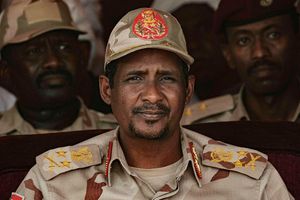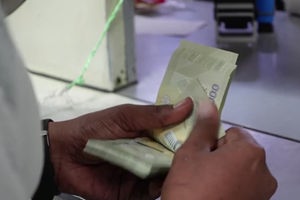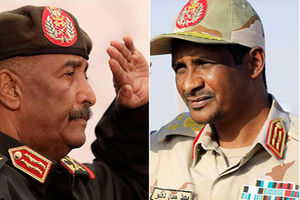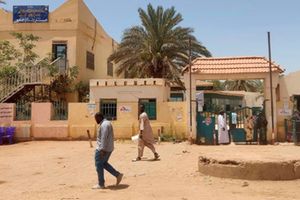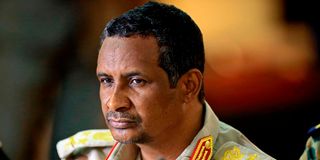
Sudan's paramilitary Rapid Support Forces commander, General Mohamed Hamdan 'Hemedti' Dagalo.
The US this week handed down the much-expected-but-delayed sanctions on Mohamed Hamdan Daglo ‘Hemedti’, the commander of the Rapid Support Forces (RSF) for atrocities including genocide in Darfur region.
The decision could upend the war, and probably help push for an end of the violence. Either that or it could embolden the sanctioned entities, making dialogue difficult to achieve.
In fact, this dilemma may have informed the delayed decision to sanction Hemedti, who alongside Abdel Fattah al-Burhan, the commander of the Sudan Armed Forces (SAF) are considered the most influential figures in this war.
However, reports after reports, including from rights watchdogs and the UN investigators, have lately castigated the RSF as the most sinful entities when it comes to attacking civilians or restricting aid headed to the displaced.
Washington, concurrently, sanctioned Hemedti’s associates including companies said to be fueling the war by fetching revenues through illegal gold sales. Yet the move raised questions about whether international sanctions can truly impact the protracted war that has ravaged the country since April 2023.
Indeed, some analysts have argued that the move comes far too late. Human rights groups and political advocates have long demanded more decisive action.
Lauren Fortgang, Executive Director of PAEMA, a US-based organisation working with communities in war-affected countries, emphasized that the announcement “finally acknowledges the daily suffering of millions of Sudanese living in hellish conditions.”
However, she warned that such designations must be followed by “practical measures matching the severity of the humanitarian catastrophe.”
Fortgang stressed that truly effective sanctions must also target international actors involved in funding and arming Sudan’s warring factions.
The conflict in Sudan is shaped by intricate regional and global dynamics. The United Arab Emirates, accused of supplying arms and financial support to Hemedti, remains a central figure in this equation. Analysts believe that exposing this involvement could mark a significant turning point in efforts to end the conflict.
Observers argue that economic sanctions, while important, are rarely sufficient to halt conflicts without a robust political framework. Republican Senator Jim Risch, a longstanding critic of US policy on Sudan, noted that “sanctions without an integrated political strategy are little more than performative gestures.”
Sudanese researcher and writer Mohamed Suleiman, based in Boston, US, argued that classifying the RSF as a terrorist organisation “could have a more profound impact than conventional sanctions.”
“The current sanctions are largely symbolic, but they lay the groundwork for broader pressure against Hemedti and his financial networks.”
Suleiman said efforts must extend to accountability mechanisms through international bodies like the International Criminal Court (ICC).
“Sanctions must also encompass external backers of the conflict, including the UAE, to achieve any meaningful impact,” he said.
More than 11 million Sudanese have been displaced by the ongoing war, according to United Nations estimates, including more than 3 million as refugees The situation in Darfur remains dire, with entire communities—including the Fur, Masalit, and Zaghawa—deliberately targeted in a campaign of ethnic violence. Large-scale attacks in areas like El Geneina and Murnei serve as grim reminders of the crimes that prompted the genocide designation.
The Yale Humanitarian Research Lab (HRL), which has documented violations since the conflict’s onset, highlighted the vital role of ordinary Sudanese in collecting evidence.
Despite immense risks, citizens have used smartphones and local media to expose atrocities. “Labeling these crimes for what they are—genocide—is crucial,” said Nathaniel A. Raymond, Executive Director of Yale HRL.
“But real consequences for the perpetrators must follow.”
While the declaration of genocide marks a shift in its approach, the future remains uncertain. Can these sanctions alter the RSF’s conduct? Will Hemedti’s influence be curtailed, or will his alliances deepen the military and political quagmire?
One key question will be on whether the United Arab Emirates continues to deal with the RSF in the sanction era. The UAE, of course, has often rejected accusations it arms RSF. But among the sanctioned entities were RSF-linked companies operating from the Dubai.
Ultimately, without a unified international response and the political will to address Sudan’s deeper crises, any sanctions or declarations risk becoming hollow gestures.
The designation of genocide is a step on the long road to justice, but it must be backed by broader, enforceable actions to bring this prolonged tragedy to an end.

